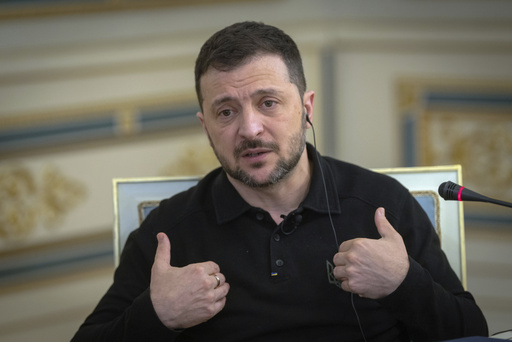
KYIV, Ukraine — On Saturday, Ukrainian President Volodymyr Zelenskyy expressed concerns that not including Ukraine in discussions between the United States and Russia regarding the ongoing war would be a significant threat. He urged for more engagement between Kyiv and Washington to create a strategy aimed at achieving a ceasefire.
In an exclusive interview, Zelenskyy remarked that Moscow is unwilling to enter ceasefire negotiations or consider any concessions, viewing them as a form of defeat during a time when its forces seem to excel on the battlefield. He suggested that U.S. President Donald Trump holds the key to persuading Russian President Vladimir Putin to consider dialogue by leveraging potential sanctions that could impact Russia’s energy and banking sectors, alongside continued military support for Ukraine.
“These are the closest and most important steps,” he noted in the interview that lasted over an hour in the Ukrainian capital. Zelenskyy’s commentary came after Trump mentioned that American and Russian officials were in preliminary discussions about bringing the conflict to a close. Although Trump stated that significant conversations had occurred, he did not provide further details.
“They may have their own relations, but discussing Ukraine without us—it’s a risk for everyone,” Zelenskyy insisted. He mentioned that his team has maintained communication with the Trump administration, but those talks remain at a “general level.” He expressed hope for forthcoming face-to-face meetings to establish more specific agreements.
“More focus is needed on this,” he added, acknowledging Trump’s understandable preoccupation with domestic issues during the initial weeks of his presidency. The war in Ukraine, which has now persisted for nearly three years, finds itself at a critical juncture. Although Trump had promised to resolve the conflict within six months of his inauguration, the two sides appear entrenched, and the pathway toward a ceasefire remains uncertain. Meanwhile, Russia continues to progressively advance, with Ukrainian forces facing significant personnel shortages.
The majority of Ukrainians are yearning for a cessation of hostilities to restore their lives. With near-daily Russian assaults on residential structures and strikes on power grids plunging cities into darkness, the human cost is severe. Millions of Ukrainians have been forced from their homes as vast regions, especially in the east, lie in ruins. Currently, approximately one-fifth of Ukraine is under Russian occupation, with pro-Moscow officials actively working to erase any vestige of Ukrainian identity in these areas.
With Trump returning to the Oval Office, Ukraine’s relationship with the U.S.—its primary ally—finds itself at a pivotal point. Zelenskyy recalled an initial conversation with Trump during the presidential campaign, where they agreed to meet if Trump won to discuss the necessary steps to conclude the war. However, a previously scheduled visit by Trump’s envoy to Ukraine, Keith Kellogg, was postponed due to legal issues, which was then followed by a sudden freeze on foreign aid that stymied Ukrainian initiatives.
“I believe that holding a direct meeting with him is crucial. This is also something that is desired across Europe,” Zelenskyy remarked, referring to the collective goal for a swift resolution to the conflict.
Following his discussion with Trump, he expressed a desire to move towards a format for negotiations that included U.S., Ukrainian, and Russian representatives, emphasizing the importance of including a European Union voice as well. “If we could get the U.S. to the table along with Ukraine and the Russians, it would be fair and effective,” Zelenskyy stated, though he acknowledged the uncertainty of the future direction.
He warned against allowing Putin to dominate the conflict, alluding to Russia’s frequent threats during President Biden’s administration. Zelenskyy emphasized that without solid security assurances from Ukraine’s allies, any agreement reached with Russia could merely precede further hostilities. His desire for NATO membership remains steadfast, a possibility that Moscow has outright dismissed in the past.
Zelenskyy posited that NATO membership would represent the most cost-effective option for Ukraine’s allies while simultaneously strengthening Trump’s geopolitical standing. He expressed confidence that these security guarantees would be the least expensive solution for all parties involved.
“It would signal that Russia does not have the authority to dictate who joins NATO; that decision rests with the United States,” Zelenskyy asserted, appealing to Trump’s preference for successful outcomes. Moreover, he noted that Ukraine’s sizable military force, comprising around 800,000 troops, could benefit NATO, especially if Trump seeks to repatriate U.S. troops stationed abroad.
He also emphasized the necessity for other security guarantees to be backed by substantial arms supplies from the U.S. and Europe, along with support for the growth of Ukraine’s defense industry. Furthermore, he mentioned that a proposal from France to deploy European forces in Ukraine as a deterrent against Russian aggression is progressing but expressed skepticism about its execution due to unresolved questions regarding command structure and troop positioning.
“While we are interested in this proposal as part of our security guarantees, it cannot be the sole assurance of our safety,” he remarked. He continued, “Consider the scenario: Who would be in command? What are their roles in response to potential Russian attacks? How would they respond to missile threats, land incursions, or maritime offensives?”
When asked if he had directly addressed these concerns with Macron, he smiled and remarked, “The dialogue is ongoing.” In response to U.S. Secretary of State Marco Rubio’s assertion that the war has regressed Ukraine by a century, Zelenskyy extended an invitation for Rubio to travel to Ukraine. He conveyed the importance of witnessing firsthand the devastation wrought by Russia and acknowledging the resilience of the Ukrainian people in ensuring their own security and that of the global community.

